Best Fitness Apps in 2025 – Top Picks by Category
Read this article in Deutsch, Español, Français, Italiano, Nederlands, Polski, Português, Svenska.
Fitness apps are evolving rapidly, offering everything from smart workout planning to on-demand coaching. Below we break down the best fitness apps of 2025 in five categories, each with detailed features and feedback. Whether you lift at the gym, exercise at home, track your nutrition, seek personal coaching, or want an AI-powered trainer, there's an app for you. We've included both free and paid options, and highlighted real user opinions (from Reddit and elsewhere) alongside expert reviews to help you decide.
Best Lifting Workout Planner Apps
These apps excel at planning and tracking weightlifting workouts. They help you log sets, reps, and weights, visualize progress, and often suggest routines or increases to keep you improving. If you're serious about strength training or bodybuilding, the following apps offer robust workout logs and smart planning tools.
Strong
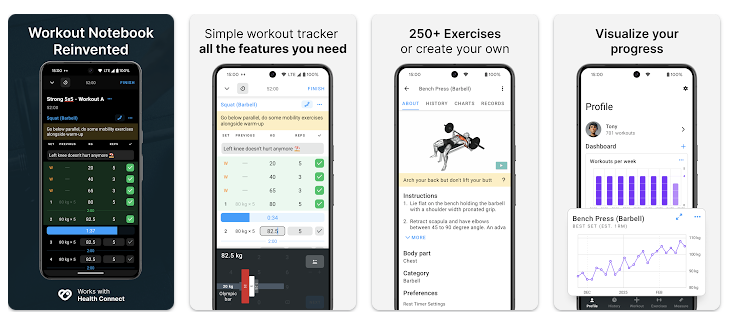
Strong is a popular, no-frills gym logbook that lets lifters easily record workouts and monitor progress. It has a clean interface with an exercise library of 200+ movements and focuses on detailed tracking rather than guided training. You can save routine templates (up to 3 on the free version) and the app highlights your personal records to keep you motivated. Many experienced lifters love Strong for its simplicity and focus: "This is essentially a workout and metrics tracker... it highlights personal records, which after years of training helps keep me motivated". While it lacks built-in coaching or fancy visuals, advanced users don't mind – as one Reddit user noted, Strong "just works" for straightforward logging. The free version is feature-rich, and a Pro upgrade (~$4.99/month) unlocks unlimited routine saves and body measurement tracking.
Hevy
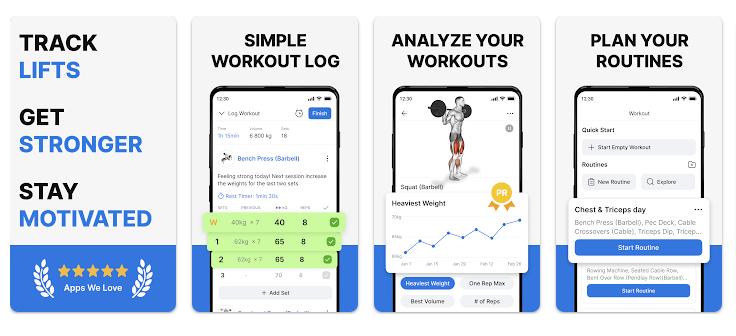
Hevy is a newer gym log app that has quickly become a favorite among lifters for its modern design and generous free tier. It offers everything Strong does – workout logging, custom routine templates, rest timers – but with a slicker UI and active development. Users frequently mention that Hevy's free version allows more routines and features than Strong's free version. It also integrates well with wearables (Apple Watch, etc.) and even has a social feed for those who want to share workouts (which can be ignored if you prefer solo tracking). One Redditor who switched from Strong to Hevy noted "Hevy has a slightly better free tier, nicer UI, more free templates, better device integrations… Hevy has shown a lot more development". In short, Hevy is praised for being user-friendly and full-featured at no cost, though there's a Premium upgrade (~$39/year) to unlock advanced analytics and unlimited everything. If you want an actively updated lifting app with a great free mode, Hevy is an excellent choice.
Jefit
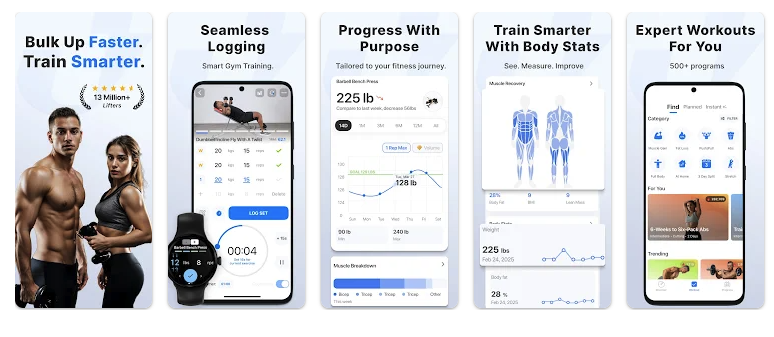
Jefit has been a staple in gym tracking for years and remains one of the most comprehensive lifting planners. Its strength lies in an enormous exercise library (1,400+ exercises) each with video demos, which is "one of the most comprehensive libraries…I searched 'snatch' and 15 variations came back" according to one expert reviewer. Jefit lets you build custom routines or download community-made programs, and it supports both bodybuilding-style and powerlifting workouts. The app charts your progress with graphs and stats, and even syncs with devices like Apple Watch for quick logging. The free version includes basic tracking (with ads), while the Elite plan (~$12.99/month) removes ads and adds advanced features like progress tracking metrics, notes, and wearable integration. Jefit's variety and depth are its selling points – it's great if you like exploring new exercises or need visual guidance on form.
Fitbod
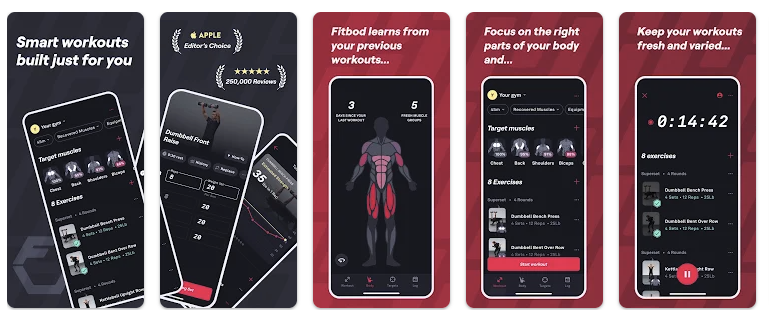
Fitbod is an intelligent workout planner that uses algorithms (AI) to generate strength training routines tailored to you. You input your fitness level, goals, and available equipment, and Fitbod will suggest a workout each day – adjusting sets, reps, and exercises based on your logged performance and muscle recovery state. Essentially, it takes the guesswork out of programming by applying progressive overload automatically, which many users find effective for continual gains. Fitbod has a loyal following; it's often called the "gold standard for AI-driven muscle-building apps," combining solid exercise science with an easy interface. The app can be especially handy if you're not sure how to structure workouts or want fresh routines regularly. Keep in mind: Fitbod is free to download but largely requires a subscription (about $12–$15/month) after a limited number of workouts.
Alpha Progression
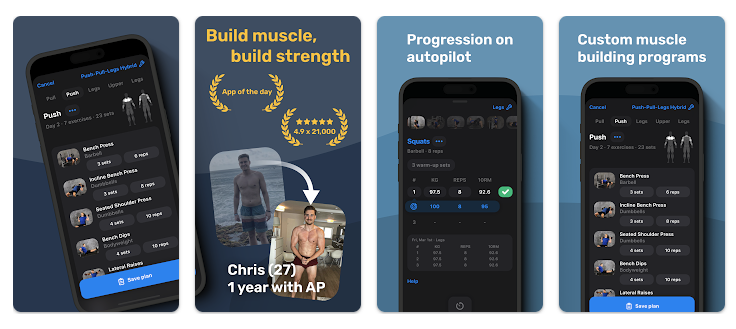
Alpha Progression is an up-and-coming lifting app out of Germany that's gaining global fans for its hypertrophy-focused training plans and progression guidance. It's essentially a gym log and program builder that uses smart algorithms to nudge you toward muscle and strength gains. Alpha Progression will recommend how much weight and reps to lift for each set based on your past workouts, ensuring you steadily overload your muscles. It even incorporates advanced concepts like Reps in Reserve (RIR) tracking and planned deload weeks to manage fatigue – features typically only seen in serious lifting programs. The base app is free and quite functional for logging and creating routines, but the Pro version (~$10/month or ~$64/year) unlocks the AI plan generator and advanced analytics.
Best Home Training Apps
If you prefer to work out at home (or anywhere outside a gym), these apps bring trainer-led workouts and customized routines to your phone or TV. The best home training apps offer bodyweight exercises, minimal-equipment workouts, and even live classes – perfect for living room fitness. We've chosen a mix of free and subscription apps known for quality content and high user satisfaction.
Nike Training Club (NTC)
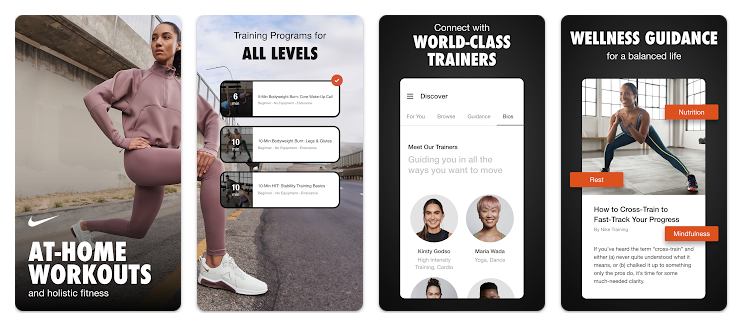
Nike Training Club is a top free app offering a vast library of workouts for all fitness levels. It includes 300+ workouts designed by Nike's trainers – from bodyweight strength sessions and HIIT drills to yoga and mobility routines. NTC's workouts come with video guidance and audio cues, and you can filter by workout length, intensity, or equipment (many require none). Users love that it's completely free with no hidden paywalls – a rarity for such polished content. With high production quality and an average 4.7★ App Store rating, Nike Training Club is a must-try home workout app.
Fitia
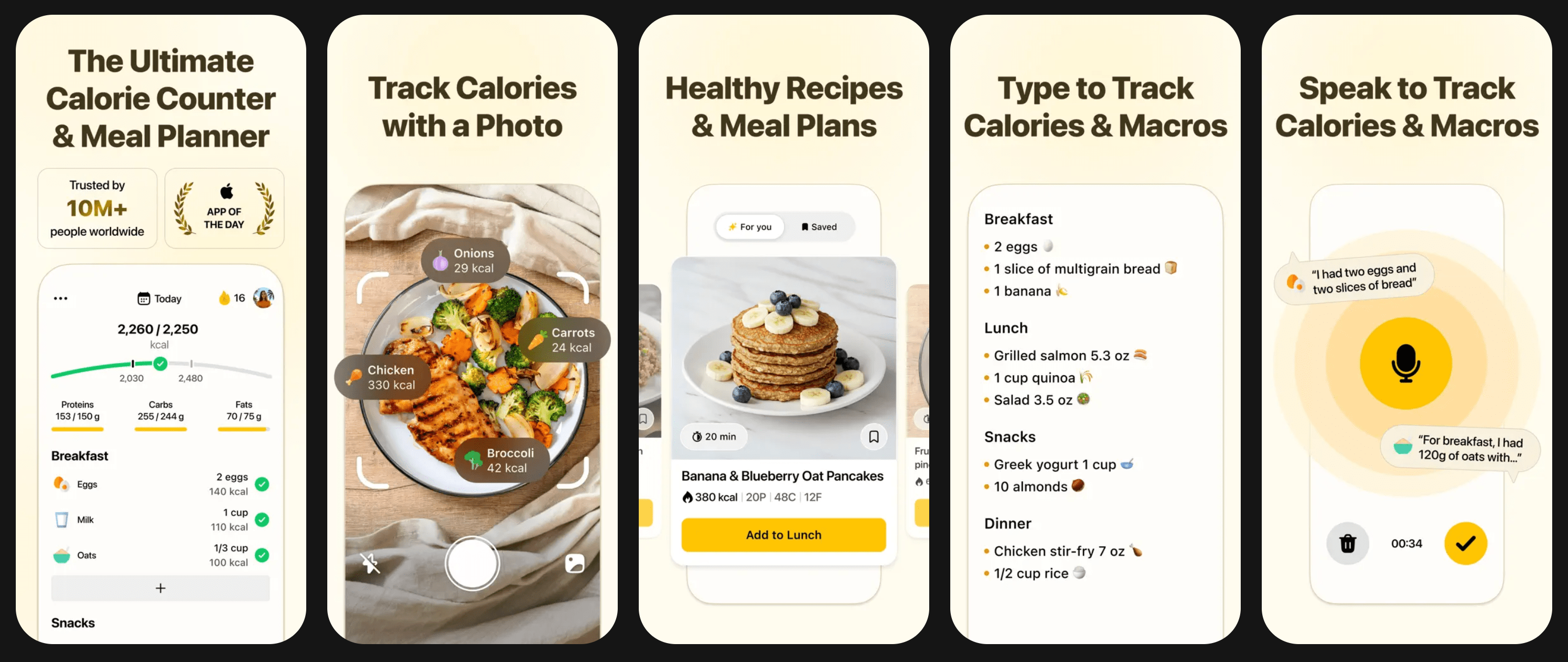
Fitia brings intelligent nutrition support to your home training routine by pairing advanced AI meal planning with a dietitian-verified food database. Instead of guessing what to eat around your workouts, Fitia creates adaptive meal plans that match your macros, recovery needs, and dietary preferences — whether you're lifting in the garage or following a living-room HIIT session. Logging is frictionless thanks to photo, voice, barcode, and manual entry options.
The 24/7 Fitia Coach provides instant guidance and accountability, answering questions about fueling, portion sizes, and hydration on demand. Smart shopping lists sync to your plan, biometrics tracking keeps tabs on progress, and adaptive adjustments ensure your nutrition evolves with your training block. There's a generous free tier, while Premium unlocks full AI capabilities and meal planning for $19.99/month or $59.99/year; a family plan covers up to six users for $89.99/year.
Standout Fitia Features:
- • 24/7 AI nutrition coach for instant meal and macro guidance
- • Flexible tracking with photo, voice, search, or text logging
- • Personalized meal plans that adapt to any diet style or goal
- • Dietitian-built database with smart progress and biometrics tracking
- • Smart shopping lists that sync with your training schedule
Freeletics
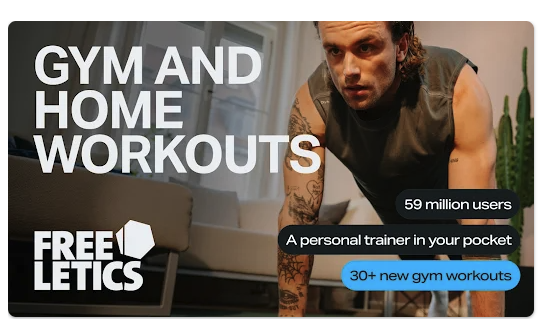
Freeletics is an AI-powered fitness coach focused on bodyweight workouts you can do anywhere. It became famous for its no-equipment HIIT routines and "Coach" feature that adapts training to your feedback. When you start Freeletics, you enter your goals and fitness level; the app's AI then builds you a personalized workout plan (called a "Training Journey"). Each workout comes with instructional exercise videos and a timer – it's intense but scalable. The app offers a free version with a limited selection of HIIT workouts, but the full personalized coach requires a subscription (~$34.99 for 3 months).
Ladder
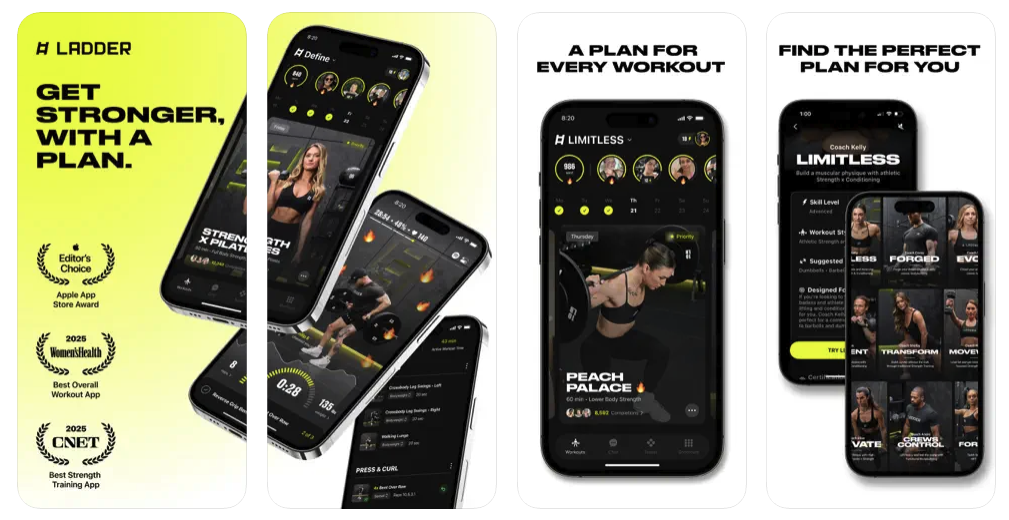
Ladder brings expert-designed strength programs to your home, essentially offering you a structured gym plan to follow with minimal guesswork. When you join Ladder, you choose a program team led by a coach (for example, a kettlebell program, a bodyweight program, a hypertrophy gym program, etc.). The app then delivers daily workouts in a 5-6 week progression, complete with video demonstrations and a clear schedule. There is no free tier; Ladder costs about $29.99/month for the base membership (program access and group coach guidance). One catch: as of 2025 Ladder is only on iOS (no Android app yet).
FitOn
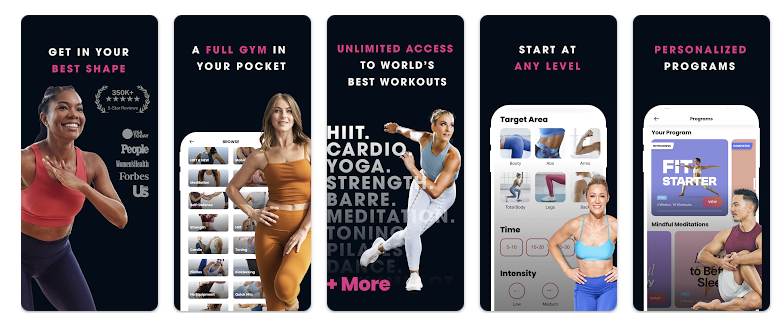
FitOn is a wildly popular 100% free workout app that offers an impressive variety of home workout classes. It features celebrity trainers and influencers (like Cassey Ho for Pilates and Jeanette Jenkins for cardio) leading video sessions you can follow anytime. FitOn covers everything: HIIT, strength, dance, yoga, Pilates, stretching, and even meditation. The app stands out for being completely free with unlimited workouts. The app has a social community aspect (you can add friends, join group challenges, and even do live video workouts with friends via "FitOn Party"). With its 4.9★ rating and huge user base, FitOn is a fantastic choice for free home workouts packed with variety and community support.
Best Nutrition Tracking Apps
Proper nutrition is half the battle in fitness. These nutrition apps help you track what you eat, manage calories or macros, and develop healthy habits. We've picked the top apps for calorie counting, diet planning, and food logging – including options praised by the Reddit community and dietitians. Whether you're bulking, cutting, or just eating healthier, these apps put a food journal in your pocket.
MyFitnessPal
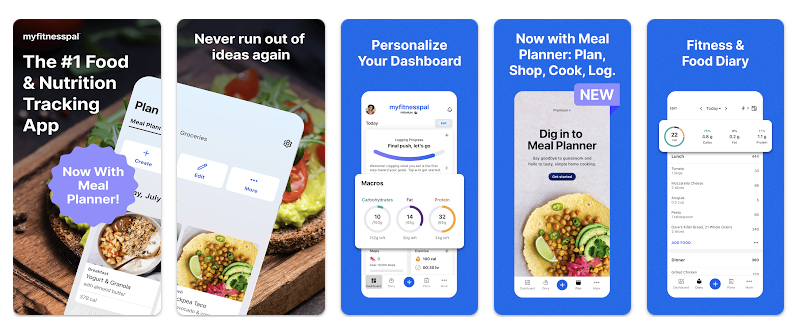
MyFitnessPal (MFP) is the veteran of calorie counters – a hugely popular app that's been around for over a decade. It's known for its massive food database (over 14 million foods) and barcode scanner, making logging meals very convenient. MFP tracks your calories, macros, and more, and can also log exercise and steps, giving you a picture of calories in vs out. Important: In late 2022, MFP put the barcode scanner behind the Premium paywall, which caused some discontent among long-time users. The free version still lets you search and log foods, but features like scanning, macro goals, and food analysis require Premium ($19.99/month or $79.99/year).
Cronometer
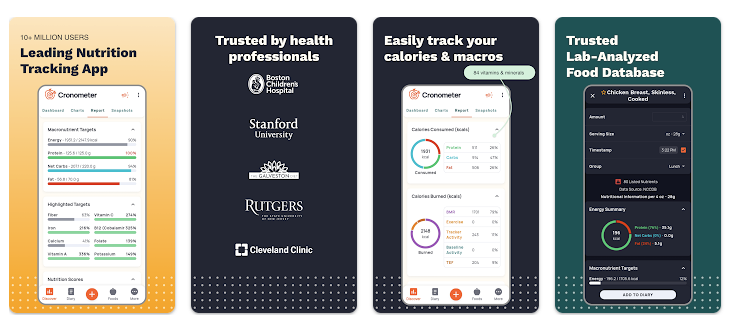
Cronometer is a precision-focused nutrition tracker beloved by those who want deep nutritional data. Unlike most calorie apps, Cronometer tracks up to 84 micronutrients (vitamins, minerals, etc.) in addition to calories and macros. Its food database leans on verified sources like the USDA, meaning the data is very accurate – you won't find the huge clutter of user-created entries that other apps have. The app is free with ads, and a Gold subscription (~$8.99/month or $49/year) removes ads and adds extras like recipe imports and more charts. Many Reddit users switched to Cronometer when MFP introduced paid scanning, since Cronometer's free version includes a barcode scanner and all core features.
Fitia

Fitia is a calorie counter and meal planning app that combines advanced AI with a massive, dietitian-verified database built by an in-house team of nutrition experts. Its science-based algorithms personalize calorie and macro goals to help you lose, gain, or maintain weight while adapting to any diet style — from high-protein to keto or vegetarian. Logging is effortless thanks to photo, voice, barcode, and manual entry options.
Fitia Coach delivers 24/7 AI nutrition support, offering instant answers, accountability, and adaptive adjustments based on your biometrics. Smart shopping lists sync to your plan, and premium subscribers unlock full meal planning alongside advanced AI insights. A generous free tier makes it easy to get started, while Premium costs $19.99/month or $59.99/year and the family plan covers six users for $89.99/year.
Key Features:
- • 24/7 Fitia Coach for instant AI-backed nutrition guidance
- • Track meals via photo, voice, barcode search, or text
- • Personalized meal plans that adapt to any diet type
- • Dietitian-verified database with smart progress adjustments
- • Biometrics tracking, smart shopping lists, and plan syncing
Pricing:
Free with basic calorie tracking • Premium: $19.99/month or $59.99/year • Family plan: $89.99/year for up to six users
MacroFactor
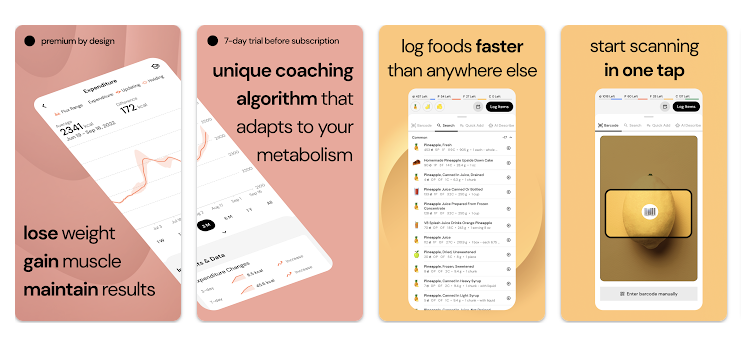
MacroFactor is a newer app (launched 2021) that has quickly gained a cult following among fitness enthusiasts, especially on Reddit, for its powerful macro tracking and coaching algorithm. Unlike traditional food logs, MacroFactor doesn't just track your intake – it actively adjusts your nutrition targets each week based on your actual metabolism and progress. Users input their food and body weight daily, and the app's "AI coaching" calculates your true energy expenditure and updates your calorie/macro goals to keep you on track for your weight loss or muscle gain targets. The app is subscription-only (around $11.99/month or $79/year), with a 7-day free trial.
Lifesum
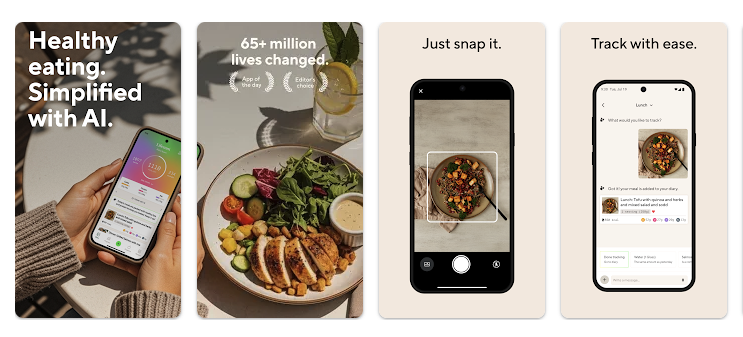
Lifesum is a beautifully designed nutrition app that combines calorie & macro tracking with healthy habit coaching. It's often recommended for those who want a more lifestyle-oriented tracker. Lifesum has a free version that allows basic logging of food, water, and exercise, but to unlock its full potential you'd use the Premium version (~$8/month). Premium offers tailored meal plans (like high-protein, keto, Mediterranean, etc.), recipes, and even a "Life Score" that grades your daily eating habits. One standout feature is Lifesum's support for intermittent fasting – it lets you choose a fasting schedule (16:8, 5:2, etc.), then it will adjust your calorie/macro targets for your eating window and provide a fasting timer.
Best Coaching Apps
If you want a more hands-on approach – like having a personal trainer or coach guide your workouts and keep you accountable – these coaching apps are for you. They connect you with real human trainers or provide smart coaching services through an app. Expect personalized workout plans, check-ins or chat with your coach, and motivation to stick to your routine. We've gathered apps that cater to different budgets, from premium one-on-one coaching to affordable remote training.
Gymscore
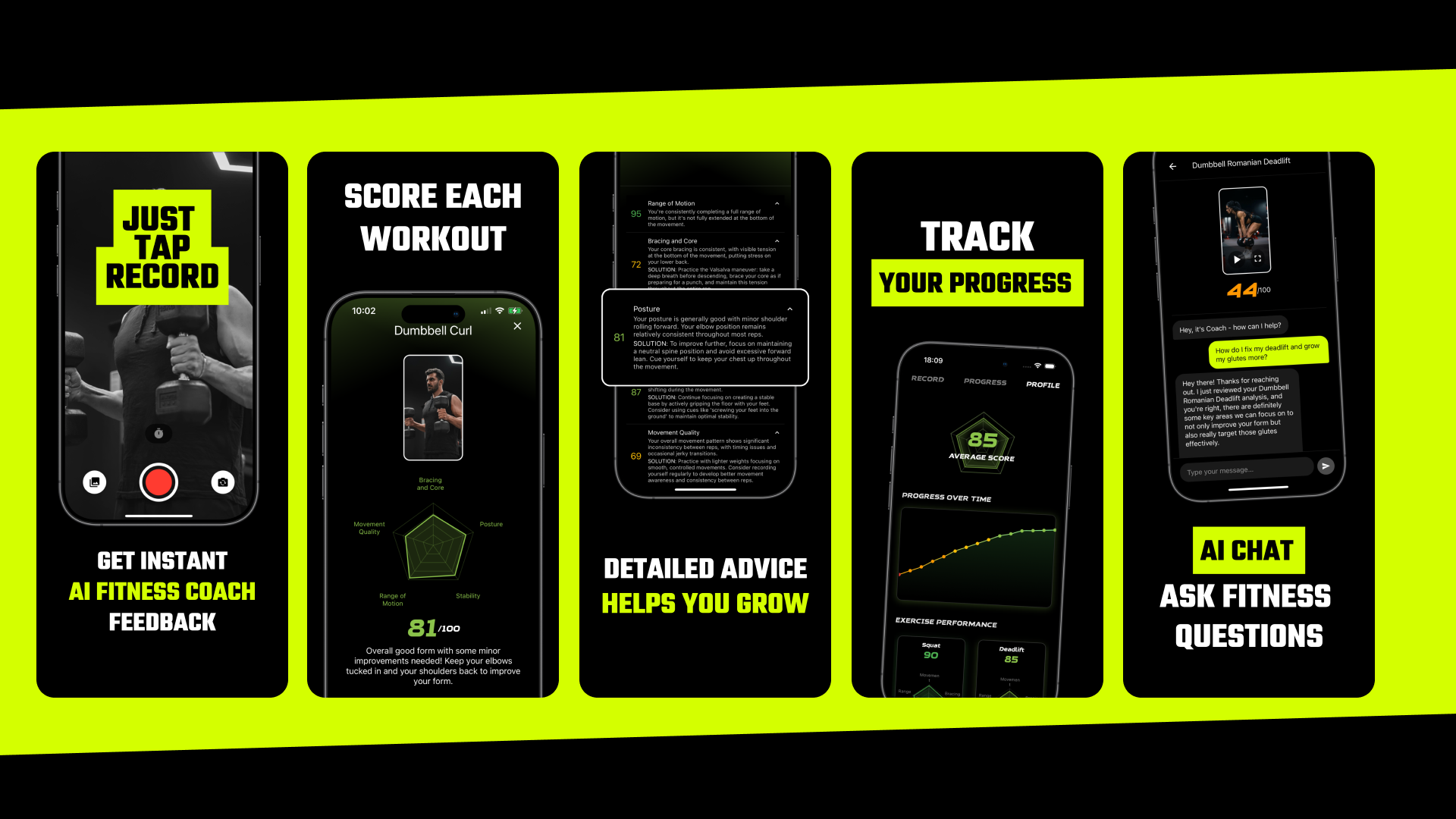
Gymscore is your AI fitness coach designed to elevate workouts through advanced form analysis. Whether you're a beginner or seasoned athlete, Gymscore provides instant, professional-grade feedback by analyzing your exercise technique across five key areas: bracing and core strength, posture and spinal alignment, foot placement and balance, range of motion optimization, and overall movement efficiency. Simply record your workouts or upload existing videos, and the AI handles the detailed analysis. The app delivers comprehensive insights into your form, assigns scores (0-100) to track progress objectively, and offers personalized recommendations to help you train safely while maximizing results. With a 4.8/5 user rating and journalists calling it "the next best thing to a fitness coach," Gymscore fills the crucial gap in remote coaching.
Future

Future is often hailed as the gold standard of online personal training apps. When you sign up for Future, you're matched with a certified coach who creates a custom workout program for you each week, tailored precisely to your goals, schedule, and available equipment. What sets Future apart is the level of interaction: your coach checks in with you daily via text messages on the app, adjusts your plan based on your feedback, and you can even send them videos of your exercise form for critique. The app itself hosts your workouts with demo videos and timers, and it syncs with an Apple Watch to monitor your effort. Future is $199/month (though that includes unlimited coaching and a 1-month free trial).
Caliber
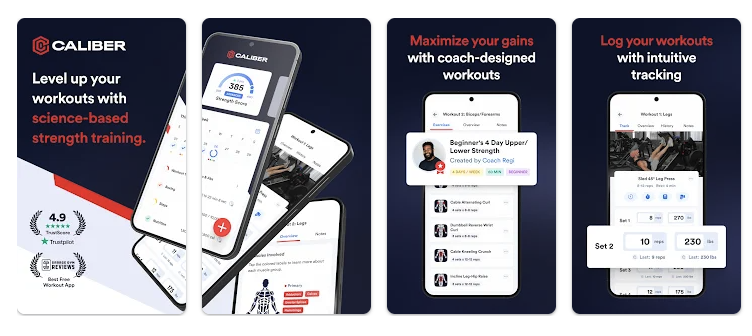
Caliber blends software and human coaching to offer a flexible personal training experience. The app itself has a robust free workout platform (with 100+ strength programs and a slick tracker), but its standout feature is the option to upgrade to 1-on-1 coaching at different tiers. Caliber's coaching is focused on strength training and body recomposition (gain muscle, lose fat) and is known for being beginner-friendly. With Caliber's free tier, you can use their library of workouts and even community features. If you opt for Caliber Premium (around $200/month), you get matched with a certified trainer and nutrition coach who communicates with you through the app's chat and video calls.
Kickoff
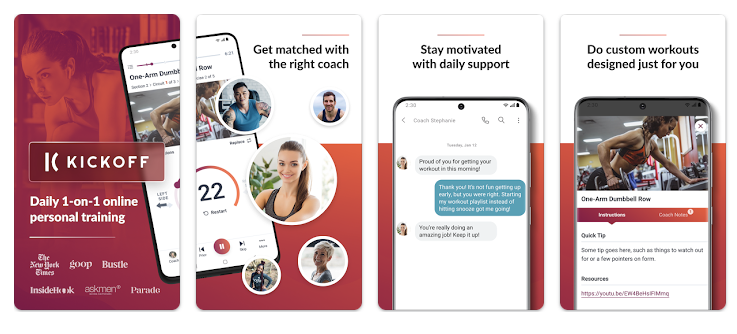
Kickoff makes hiring a personal trainer online much more affordable by leveraging texting and an app for daily communication. The pitch is "a certified personal trainer via app & text for $3 a day" – which comes out to roughly $90 per month. With Kickoff, you fill out a questionnaire and get matched with a coach (or you can choose from a list) who then builds your workout plan and check-in schedule. You'll receive workout routines in the app (including video demonstrations) and you report back on how it went. The coach will message you at least once a day – often multiple times a day – to monitor your diet, encourage you, and adjust your plan.
Trainwell (formerly CoPilot)
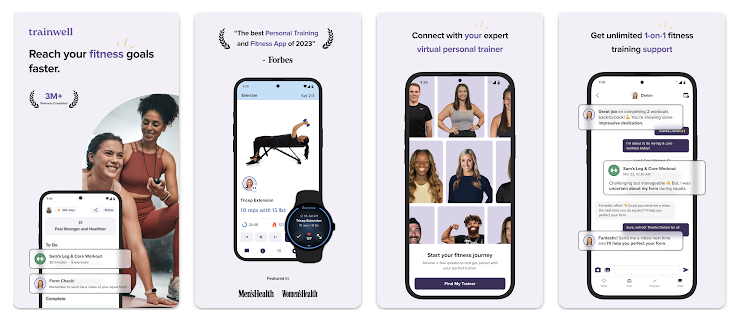
Trainwell (formerly known as CoPilot) is a personal training app that pairs you with a coach and uses technology to enhance your workouts. It's notable for its motion-sensing AI: if you have an Apple Watch, Trainwell can detect your reps, pace, and form during workouts and relay that to your coach for feedback. This means your coach isn't blindly trusting your input; they actually get data on how you're performing. Trainwell focuses on both workout coaching and nutrition guidance, making it a good option for weight loss and general fitness coaching. Trainwell is priced at $99/month and offers a 2-week free trial.
Best AI Fitness Apps
AI is making fitness coaching more personalized than ever. The best AI fitness apps use artificial intelligence to create custom workout plans, adapt on the fly, and even analyze your form – acting like a virtual personal trainer. In 2025, a number of AI-powered apps have stood out. Below are the top picks, ranging from strength training algorithms to computer-vision workout trackers.
Gymscore

Gymscore stands out in the AI fitness space by focusing specifically on exercise form analysis rather than just workout programming. This computer-vision-powered app analyzes your lifting technique across five critical dimensions: bracing and core activation, posture and alignment, foot placement and stability, range of motion, and overall movement efficiency. Simply record or upload your workout videos, and Gymscore's AI delivers instant, structured feedback with a numerical score (0-100) to track your technique progress over time. What makes Gymscore particularly valuable is how it addresses the biggest gap in remote fitness coaching – ensuring proper form to maximize results and prevent injury. Users with a 4.8/5 rating appreciate how Gymscore pinpoints subtle technique issues they might miss on their own, with journalists calling it "the next best thing to a fitness coach."
JuggernautAI
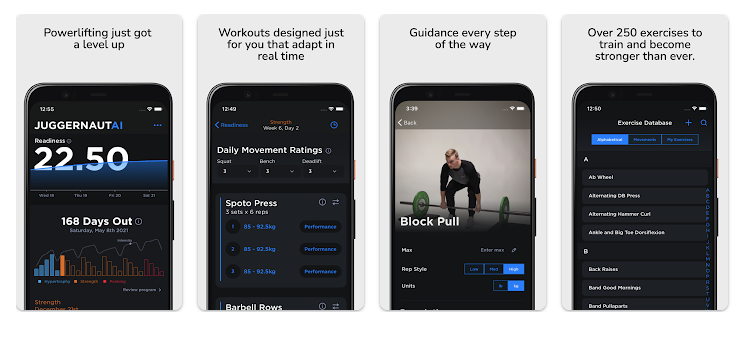
JuggernautAI is an AI-driven strength training app born from powerlifting experts, and it's perfect for serious lifters who want a tailored program. You input your goals (e.g. powerlifting meet, general strength), current stats, and schedule, and the app builds a periodized program for you. The AI coach adjusts your workouts based on your performance and even daily readiness. For example, you rate how you feel each day (sleep, soreness, etc.), and JuggernautAI will tweak that day's session – maybe reduce volume if you're fatigued, or ramp up if you're progressing fast. The app runs about $35/month. JuggernautAI truly shines as an AI personal trainer for strength sports, and it has one of the highest user ratings among lifting apps (around 4.5★ in the strength community).
Dr. Muscle
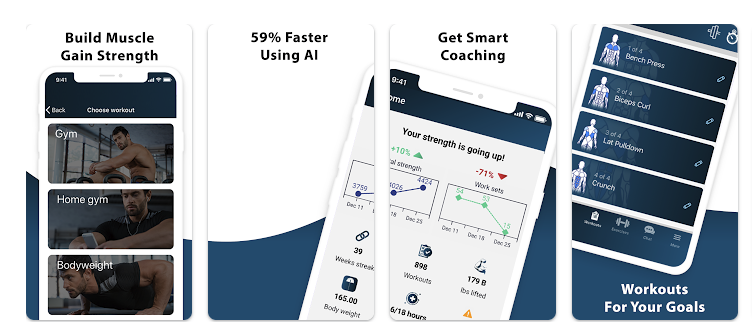
Dr. Muscle is an AI personal trainer app aimed at serious gym-goers looking to build muscle and strength. It brands itself as a virtual "smart coach" that uses scientific principles (like periodization and autoregulation) to adjust your lifting program in real time. Dr. Muscle will create a routine based on your goals (e.g., hypertrophy or strength) and as you log workouts, it uses AI to tweak your plan – increasing weight, changing exercises, or adding volume – much like a human trainer would over weeks of training. Dr. Muscle is on the pricier side: about $49.99/month, with optional meal planning add-on for ~$19/month. The app has an average 4.4★ rating, and users comment on the effective customization.
Each of these apps brings something unique to the table, be it expert programming, community support, or cutting-edge AI. The "best" app ultimately depends on your personal needs and preferences – whether you need the discipline of a coach, the flexibility of home workouts, meticulous nutrition tracking, or an intelligent trainer that fits in your pocket. With the plethora of high-quality fitness apps available in 2025, achieving your health goals has never been more accessible. Happy training!